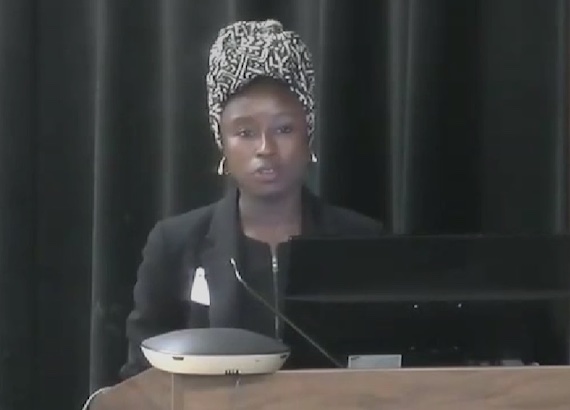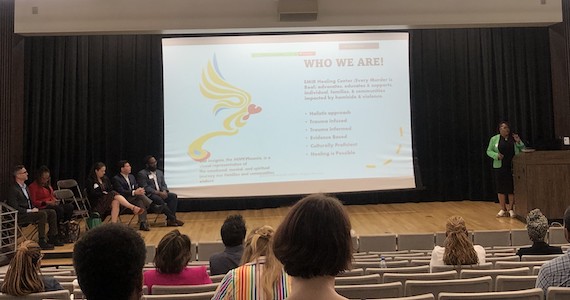Gun violence has plagued Philadelphia and other communities throughout the U.S. for generations. Rates of homicides, suicides, accidental shootings, and mass shootings are staggeringly high, and have been on the rise since 2020. Maternal and child health populations, including mothers, fathers, children, teens, and families, are impacted daily. Community and collaborative approaches are needed to address this public health crisis.
This year’s theme was “Gun Violence: Impacts and Solutions from a Maternal and Child Health Perspective.” The three-and-a-half-hour symposium was held in person and online and was followed by a networking lunch for those attending in person.
"This was a really great collection of folks to discuss the very complicated issue of gun violence." - Symposium Participant
The symposium was held to raise awareness of not only the impact of gun violence specifically on MCH populations, but also how those impacted by gun violence and their families, and local programs are working to address gun violence by addressing many of the social determinants of health that contribute to community violence, providing trauma-informed crisis response and healing after violent incidents, and advocating for resources and gun control measures. Successes, challenges, and recommendations were discussed which may be of great interest to those creating new programs as well as policymakers and funders in this space looking to better support existing programs.
Over 250 individuals registered for the symposium, representing organizations across academic, clinical, government, and non-profit agencies. Attendees included students, academic faculty/staff, clinical and public health professionals, school personnel, advocates, and families.
 MCH symposium keynote speaker Ruth Abaya, MD, MPH
MCH symposium keynote speaker Ruth Abaya, MD, MPH
Keynote: “Viewing the Gun Violence Crisis from a Maternal and Child Health Lens”
The symposium included five sessions and kicked off with a keynote presentation by Ruth Abaya, MD, MPH, Program Manager, Injury Prevention Program, Philadelphia Department of Public Health; Attending Physician, Emergency Department at Children's Hospital of Philadelphia (CHOP); Practice-based Scholar, CHOP's Center for Violence Prevention. Abaya’s interests and research focus include gun violence prevention with particular emphasis on access to firearms among high-risk adolescents as well as patient-centered approaches to prevention that draw on the experiences of the youths themselves. She is also working to create a registry of those who have experienced firearm injuries in Philadelphia to identify the most promising practices for violence, prevention, and intervention.
Abaya’s presentation, titled “Viewing the Gun Violence Crisis from a Maternal and Child Health Lens,” provided an overview of the issue, including the rise in firearm-related injury as now the number 1 cause of child mortality in the U.S., the relationship between guns and intimate partner violence, the percentages of women and children affected by gun violence both directly and over time through things like chronic stress of unsafe neighborhoods, and firearm access and ownership. Abaya then focused on looking upstream for solutions and the importance of addressing the social and structural inequities leading to disenfranchised communities.
“So not just reduce violence, but promote thriving and communities, which we have to do both. So, living wages, employment and job training, changing the built environment, accessing mental health services, improving educational opportunities, treating substance use, restoring trust in the criminal justice system. If we don't do these things, even a near term reduction in violence isn't building opportunity. It isn’t creating a trajectory towards hope in communities that have been chronically disinvested.”
Panel Discussions: "Centering Youth & Family Voices" and "Successful and Innovative Prevention Strategies"
Two panel discussions followed, highlighting strategies to both reduce gun violence and address these upstream factors.
Attendees first heard from a powerful panel of individuals personally affected by gun violence who shared how this impacted their families, the ways in which they started to heal, and how they are now helping others. Panelists discussed the importance of listening to the stories of affected families and youth in a way that honors their loss rather than serving the needs of a news media narrative, creating safe spaces for kids to just be kids, and increasing awareness of available resources for families affected by gun violence.
“…listening to how mature and intelligent they are…more adults…need to sit down and let our young people talk about these issues. Share their perspectives and listen. So that's what I decided to do as part of my healing journey.”
During the next panel, professionals from various settings (clinical, legal, community, and school) discussed their programs and the work they do to prevent gun violence or provide crisis response supports in MCH populations.
 The second panel at the MCH symposium
The second panel at the MCH symposium
Topics included the role of poverty and other social determinants of health, the importance of trauma-informed mental health services, understanding the relationship between concerns about community gun violence and gun ownership/use, the need for funders to consider interrelated aspects of gun violence, the unrealistic expectations that short-term funding mechanisms could achieve long-term outcomes even though structural and environmental changes to address systemic problems do not come quickly, and the need for program evaluations to not just focus on outcomes such as shooting rates but also measure and report out about important intermediate outcomes such as establishing trust, participant engagement, building collaborations and referral systems, etc. so that programs can make adjustments and learn from one another.
Panelists also discussed challenges, provided advice for new programs, and recommended priorities for policymakers and funders. The panel highlighted the need for collaborative strategies that create linkages between sectors and systems with a goal of developing child and family-centered effective public health solutions by addressing the root causes of gun violence.
“Different types of violence occur in families and communities that that are intersectional…there is intimate partner violence in a home, where the child goes out into school and experiences bullying. Eventually they may get into a school yard fight, [and] wind up in [the] emergency department [and] because of all the things that happen to them, they are contemplating suicide. I think that we know that it's all connected…we need a lot of people to do this [and] we need to work together.”
“I'm at the point where I'm tired of like having to say how remarkable people in the communities are, as far as the circumstances right now, they're able to still function. That's just not okay, right? We need to find the…public solutions to what's going on.”
Discussion of "Secondary Traumatic Stress"
Following the panels, there was an important discussion about secondary traumatic stress and workforce burnout by Laura Vega, DSW, LCSW, Co-Director for Community Violence and Trauma Support Programs at the Center for Violence Prevention at the Children's Hospital of Philadelphia. Ms. Vega provided an overview of this important topic and stressed the importance of adequate pay and paid time off for frontline staff. She also reminded those doing this work to prioritize self-care and stay connected to the reasons why they are doing this work. She also shared valuable resources for participants (see below).
Tying it All Together / Call to Action
The symposium concluded with a discussion of policy implications of the discussions throughout the day, led by Brandon Flood, Deputy Director of Government Affairs at Cease Fire PA. Throughout the symposium attendees heard about the importance of community solutions, the importance of linking all of our systems including health care, education, housing, legal support, and also leading with lived experience, including involving youth and those who've experienced violence directly in both telling the stories and in the generation of solutions.
Mr. Flood also shared some progress on bipartisan gun legislation in Pennsylvania, despite historical divides on this issue. He stated that in May 2023 a total of three (3) gun safety bills were brought to a vote in the PA House which Mr. Flood noted is significant in and of itself since the last gun safety bill was Act 79, which was passed 5 years ago, in 2018. Two of these bills, including universal background checks and extreme risk protection orders, received enough bipartisan support to advance to the Senate Chamber.
Symposium evaluations indicated attendees appreciated the opportunity to learn from a wide range of professionals and those with lived experience.
Nearly all of the attendees said that they learned something new about how gun violence impacts families and about innovative strategies to reduce gun violence. Both students and professionals found the symposium inspiring and helpful in their MCH work and would recommend this event to their colleagues and peers.
The MCH program and its co-sponsors appreciate everyone attending the symposium and look forward to continuing community conversations regarding improving the health and wellbeing of MCH populations.
You may access the full program and all speaker bios on Dropbox here.
Resources from Panelists
Maxayn Gooden, Community Engagement Manager, Philadelphia Center for Gun Violence Reporting: Resources via Linktree
Shameka Sawyer, Executive Director, 5 Shorts Project, LLC: Bout Mine | I Matter: A Short Doc Created by Teens Impacted by Gun Violence
Waltkeem Jenkins, Community Health Worker Peer (CHWP), Healing Hurt People, Drexel Dornsife School of Public Health: Violent crime leaves invisible injuries. Philly hospital staffers use their life stories to help heal them
Hugh “Tony” Thompson, BSW, Training Supervisor; Waltkeem Jenkins, Community Health Worker Peer (CHWP), and Arturo Zinny, LPC, MA, Interim Executive Director, Center for Nonviolence and Social Justice, and Program Director: Learn more about Healing Hurt People
Joel Fein, MD, MPH, Co-Director of the Center for Violence Prevention, Attending Physician, Emergency Department and Laura Vega, DSW, LCSW, Co-Director for Community Violence and Trauma Support Programs, Children’s Hospital of Philadelphia: Learn more about the Center for Violence Prevention and Take Care PHL
Eileen Horgan, Supervising Criminal Advocacy Attorney, Women Against Abuse Legal Center
Chantay Love, MHSA, CSM, Co-Founder & President, EMIR Healing Center
Brandon Flood, Deputy Director of Government Affairs, Cease Fire PA
Learn more about Dornsife’s MCH program and upcoming MCH events.
Dornsife's Maternal and Child Health Program is supported by the Health Resources and Services Administration (HRSA) of the U.S. Department of Health and Human Services (HHS). The contents are those of the author(s) and do not necessarily represent the official views of, nor an endorsement, by HRSA, HHS, or the U.S. Government. For more information, please visit HRSA.gov.